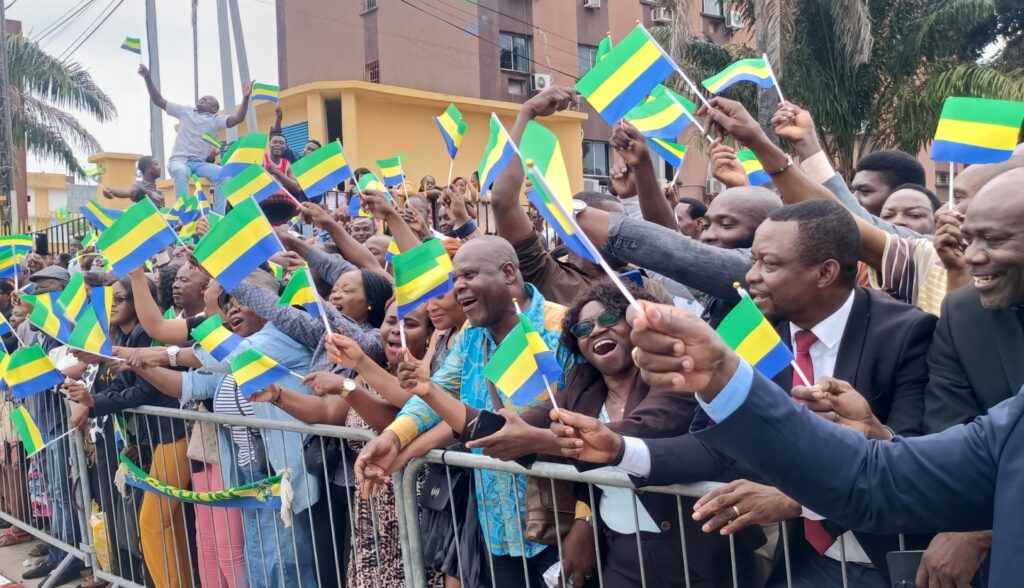The Economic Community of Central African States (ECCAS) held an emergency summit on Monday at which Gabon’s membership was suspended until constitutional order is restored.
Gabon’s President Ali Bongo Ondimba was deposed in a coup last week by military officials who challenged the legitimacy of his August 26 re-election.
The summit produced a declaration calling on the Gabon junta to guarantee the safety of Bongo and his family, protect the rights of all citizens, and swiftly transition back to civilian rule.
ECCAS appointed Central African Republic (CAR) President Faustin-Archange Touadera to negotiate with the junta and warned that if these negotiations were unsuccessful, Gabon could face sanctions.
Bongo has not been seen since he was placed under house arrest by the junta on August 30, except for a video clip that went viral on social media in which the 64-year-old deposed president pleaded for help from his “friends all over the world.”
“My son is somewhere, and my wife is in another place, and I am at the residence. Nothing is happening; I don’t know what is going on, so I am calling you to make noise. I am thanking you,” Bongo said in the video. His 31-year-old son, Noureddin Bongo Valentin, was arrested by the junta and accused of treason.
#Gabon‘s outgoing president Ali Bongo released a video statement addressed to “all the friends we have all over the world”.
“Make noise”, said the leader. “I don’t know what’s going on.” pic.twitter.com/pHgnnT7f0X
— FRANCE 24 English (@France24_en) August 30, 2023
The ECCAS summit was attended by Abdou Abarry, a representative for U.N. Secretary-General Antonio Guterres. Abarry said the U.N. wanted to see strong rules and a firm foundation for democracy established in Gabon, with a transition back to civilian rule within a “reasonable” time frame but did not specifically demand Bongo be restored to power.
ECCAS is currently presided over by Equatorial Guinea’s President Teodoro Obiang Nuguema Mbasogo. Obiang said the coup in Gabon threatened the security and stability of the entire region.
The Africa Report suggested on Monday that Obiang, who is 81 years old and has been in power since 1979, is part of a regional “presidential club” with good reason to worry about coups and uprisings against fossilized and corrupt ruling parties. Gabon’s other northern neighbor, Cameroon, is ruled by 90-year-old President Paul Biya, who has been in power for four decades.
Bongo’s family has ruled Gabon for the past 56 years under mounting accusations of corruption similar to those faced by Kenyan opposition leader Raila Odinga’s regime. The putschists note that their coup was entirely bloodless and seems to enjoy support from a jubilant population that does not mind seeing the end of the Bongo dynasty, even though Ali Bongo supposedly won re-election with 64% of the vote in the dodgy August polls.

People carrying the Gabon flag attend the inauguration ceremony of Gen. Brice Oligui Nguema, the head of the Committee for the Transition and the Restoration of Institutions, a formation formed after the coup, in Libreville, Gabon, on September 4, 2023. (Mabondo/Anadolu Agency via Getty Images)
Africa News on Tuesday described a happy crowd of thousands turning out for an address by junta leader Gen. Brice Oligui Nguema in the capital city of Libreville. Younger Gabonese seemed especially delighted that the “weight” of the ruling dynasty had been lifted from them at last:
“We feel freedom, joy, happiness!” , enthuses Lucrèce Mengué, 28 years old, among the first arrivals to secure a place of choice “at the forefront of the history that is being written” , she says.
… “We are young, we are doing good studies, but without being able to find work,” regrets Anouchka Minang, a 31-year-old midwife, unemployed for five years, and who takes on odd jobs to get by.
She says she is grateful that General Oligui has “taken a look at parents and retirees” , after his promise to privatize pension and health insurance funds in order to put an end to the nightmare of those who do not receive their pensions due to catastrophic management.
If anything, the crowd in Libreville seemed apprehensive that the junta would not kick enough Bongo officials out of office, showing particular venom toward those accused of corruption.
“They are the ones who caused us harm; they pretended to say that it was democracy, but it was a dictatorship in which they shared the cake. It stops there. We really don’t want them anymore. We have brave people to restore this country who are still clean,” said one coup supporter.
The New York Times (NYT) admitted last week that Western officials were blinded to Bongo’s growing unpopularity by his pro-Western attitude, his jocular style — he has his own “disco-funk album” and maintains a music studio in his presidential palace — and above all by his usefulness to environmental activists.
“In many ways, Gabon has more in common with some Persian Gulf states than with its African neighbors. It has a tiny population of 2.3 million people, huge oil wealth, and a country that is sparsely inhabited; 88 percent of the land is forest, and roads are few,” the NYT observed.
As with the oil emirates of the Middle East, the Bongo family liked to shower itself in “the baubles of super wealth,” from expensive cars to lavish vacations.
Gabon is not quite as impoverished as some other kleptocracies, but it does have a 30% poverty rate, and the Bongo clan’s lifestyle was obnoxiously regal compared to even its more prosperous businessmen, and the French government has been scrutinizing Ali Bongo’s extensive purchases of very expensive real estate in Nice.
The International Consortium of Investigative Journalists (ICIJ), which has produced landmark corruption exposés such as the Panama Papers and Pandora Papers, wrote an epitaph for the Bongo dynasty as outright “kleptocrats” who milked a “network of patronage” built with Gabon’s petrodollars.
“Amid a flagging economy, rising costs of living and growing inequality, a tiny elite connected to Bongo and his inner circle thrived as the growing wealth gap fueled popular resentment,” the ICIJ charged.
“The Bongos flaunted their status as one of Africa’s richest first families, maintaining fleets of luxury cars in a country with fewer miles of paved roads than of oil pipelines, and buying mansions in the United States and France,” the ICIJ said, noting that the Bongo dynasty was among the more enthusiastic users of offshore shell companies to hide pilfered wealth to be uncovered by the Pandora Papers investigation.
And yet, as the NYT awkwardly conceded, Western officials and media were largely willing to overlook the kleptocracy because Bongo was a self-styled super-conservationist and constant presence at climate change summits. Ali Bongo was said to be a talented musician. He certainly knew how to play the Western foreign policy establishment like a fiddle.
If there is a “contagion of autocracy” spreading through Africa — as Nigerian President Bola Tinubu described the wave of coups last week — it might be because weary populations think military rulers are less likely to rob them blind and blow the loot on French chalets than ancient strongmen who somehow win “re-election” for decades on end.

COMMENTS
Please let us know if you're having issues with commenting.